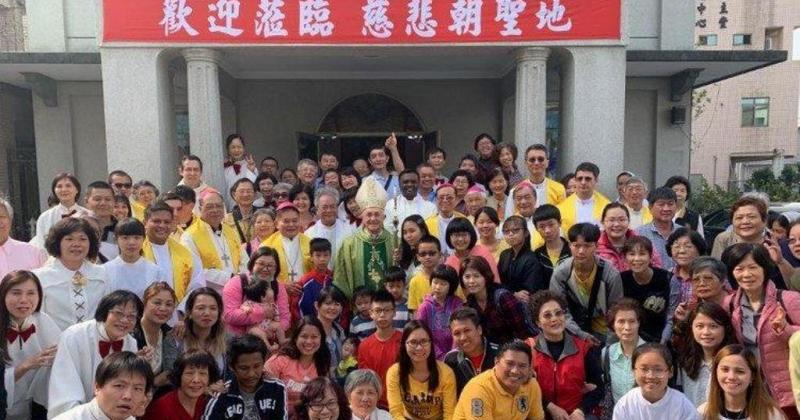During his trip to Taiwan, Macao and Hong Kong, the Cardinal Prefect of Propaganda Fide provided some useful clarifications on the guidelines regarding the agreement on the nomination of Chinese bishops.
The agreement between the Chinese government and the Holy See on the nominations of Chinese bishops will be of "great help" and "a very good thing" for the future of the Catholic Church, for reconciliation between the Chinese Catholic communities, and also for China. The inevitable difficulties can be overcome with patience, if an atmosphere of "mutual trust" between all the parties involved grows over time. And it seems misleading to interpret this agreement as the outcome of a political-diplomatic game in which one part of the Chinese ecclesial reality has "won" and another has "lost". Cardinal Fernando Filoni, Prefect of the Congregation for the Evangelization of Peoples, clearly said so during the trip that in a few days - from 27 February to 6 March - saw him in Taiwan, Macao and Hong Kong.
In his "Eastern Journey", the cardinal presided over the final Eucharistic concelebration of the IV National Eucharistic Congress of Taiwan, inaugurated charitable and cultural structures, and met the local Catholic communities. And between one commitment and another, the Prefect of Propaganda Fide also provided a handbook of clarifications and considerations - relaunched by the local media - useful for grasping the spirit, the guiding criteria over the provisional agreement signed last 22 September in Beijing by representatives of the Holy See and the Chinese government.
In Macao, on March 4, during the inauguration of some new structures of the Saint Joseph University, Filoni reiterated that the heart of the agreement "is not political, it is not diplomatic, it is pastoral". Asked by the local media, the Prefect of the Missionary Dicastery added that it represents "a hope for all", and "it will be a very good thing for the Church in the future, and also for China".
During his stay in Hong Kong, Cardinal Filoni's statements referring to the China-Holy See agreement (also reported by the South China Morning Post) indicated this understanding as a contribution to fostering reconciliation between the Chinese ecclesial communities. The cardinal also recalled the necessary patience that ought to accompany this process of healing from the contrasts that still wound the ecclesial body: "After 70 years of division", Filoni said among other things, "one can't expect problems to be solved in one day. If you have a deep wound in your body, do you expect it to heal in one day?
In Hong Kong, the cardinal also responded to perplexity and reservations about the China-Vatican agreement in the interview granted to the priest-blogger Dominique Mukonda Kananga, of the Scheut missionaries. Those who read this agreement as a "defeat" of the so-called "underground" Catholic communities and as a "victory" of the so-called "patriotic Church" express, in Filoni's opinion, a "restricted view", and apply inappropriate categories to Chinese ecclesial affairs. In this regard, the Prefect of Propaganda Fide recalled the evangelical parable of the Prodigal Son, with his father trying to explain to his older brother that one cannot react with anger and that on the contrary one must rejoice at the coming back of "who was lost and found again".
In the same way - the cardinal suggested - in recent developments in the Catholic story "one can't say of anyone having won or having lost", and instead one should be happy for having taken new steps on the path that will help to regain ecclesial communion, without reservation. A path that calls into question not only the Holy See and the ecclesial communities in China, but also the Chinese Catholics scattered throughout the world and the universal Church as a whole.
The Macao media also reports that Filoni acknowledged without problems that in the implementation of the provisional agreement new obstacles and difficulties may be encountered, but he added that "in life there are always difficulties", and they can be overcome also by increasing the climate of "mutual trust" between the parties.
Reconciliation and communion in Chinese Catholicism can encourage a new impetus to the proclamation of the Gospel on Chinese soil. The missionary vocation of the Church was at the center of the speeches and homilies of the cardinal in Taiwan, where the cardinal took part as special envoy of the Pope in the final celebrations of the National Eucharistic Congress. There Filoni spoke of the importance of missionary work, "so necessary in this island of Taiwan, where the Church is a small reality, despite many years of evangelization and many valuable social and educational works".
In many of his recent speeches, the Prefect of Propaganda Fide has re-proposed the image of the Church "in a state of mission" outlined by Pope Francis in Evangelii Gaudium. A magisterial text packed with hints and suggestions that seem to be tailored for the apostolic work to which the Church in China is called. " When we adopt a pastoral goal and a missionary style which would actually reach everyone without exception or exclusion", writes Pope Francis in that apostolic exhortation "the message has to concentrate on the essentials, on what is most beautiful, most grand, most appealing and at the same time most necessary".
Moreover, the mission of proclaiming the joy of the Gospel to all is incarnated within human limits, it takes into account the condition in which humankind live, marked by original sin and the flow of historical conditioning in which we live immersed: also because, as Saint Thomas Aquinas repeats, the "precepts which Christ and the apostles gave to the people of God “are very few” and it is always convenient "to accompany with mercy and patience the eventual stages of personal growth as these progressively occur. A small step, in the midst of great human limitations, can be more pleasing to God than a life which appears outwardly in order but moves through the day without confronting great difficulties".
